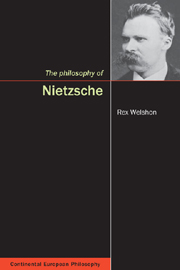8 - The will to power
Summary
The will to power is Nietzsche's most infamous contribution to philosophy. It is also among his most poorly articulated and defended concepts. To begin with, he never decided what will to power was: was it a psychological category of explanation, a reduction base for causal relations or an overarching ontological category? He says things that support all three alternatives. Nor did he ever determine how the will to power could be consistent with his rejection of the will or causality, for that matter. Moreover, he neither needed it nor used it for many of his philosophical undertakings and, where he did use it, he was, until his collapse, still working out its details. In fact, his uncertainties about the will to power were so great that, just before his collapse, he abandoned the project that had the will to power at its core. It was only his sister's sifting through the scraps of paper he left behind that provided the material that would become, under her peculiar editorship, the book published as The Will to Power. The will to power was, until the end, an experiment, and Nietzsche was more tentative and mixed up about it than he was about most other things. However, since will to power has incited so much blather from his sister, his commentators, his detractors, his exploiters and his epigones, we cannot simply ignore his reflections on the subject either.
- Type
- Chapter
- Information
- The Philosophy of Nietzsche , pp. 157 - 188Publisher: Acumen PublishingPrint publication year: 2004

